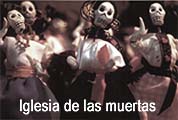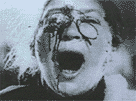INTRODUCTION to (that which is called) 'FILM STUDIES',
by a 'patient' who is certainly heretically a filmmaker
In 1985 we, in the 'refusenik' academic ward, wrote:
|
We feel that "psychoanalysis", as a dominant mode of film theoretical discourse in the 70's, is precisely one of the problems afflicting film theory. The reactive heritage that structuralism and psychoanalysis (currently masquerading as "post structuralism" and "post-Lacanian" discourse) have bestowed upon us must be exposed and neutralized. Unfortunately, our support of a critical position against 'Oedipus', 'castration', the 'lack' and the critical theocracy of 'subjectivity' has been misconstrued by some as 'anti-feminist'. Nothing could be further from the truth. We support socialist feminism, for there can be no advance in practice without productive dialogue across the lines of gender specificity and the many forms of cultural-social oppression. It is indeed unfortunate that feminism has been conflated with a reactive (pseudo) psychoanalysis of the cinema—unfortunate, because the latter mystifies and alienates the former and will not, in the long term, advance feminism or the psychological sciences (to which it pretends) in any way. We would anticipate that within several years the church of psychoanalytic subjectivity will undergo a kind of collective amnesia (or claim to have been misunderstood all along!), and maybe then everyone will turn their attention to issues not 'originating in infancy' or bound to dyadic binarisms and the narcissism of the cinema-as-mirror. -- Excerpt from Editorial (by Al Razutis and Michael Eliot-Hurst) appearing in OPSIS (1985) |
"We obviously underestimated the networks of influence."
|
The Church of Marxian Freudology - the rise of 'Film Studies' 
'Issues of Representation' (of the photographic image, of the 'male gaze', of 'female subjectivity') became the vogue in 80's academic publications on post-modernist analysis of film, television and media. University printing houses in the U.K. and the U.S. cranked out a steady stream of books on 'film theory' with an increasing number of corresponding student papers on 'visual pleasure', 'desire', 'theories of the gaze' testifying to the pre-eminence of these 'psychoanalytic doctrines' becoming entrenched in the 'cloisters' of film studies across North America and the U.K. To say that there is nothing scientific in the 'feminist psychoanalytic' methods of such authors as Laura Mulvey, Constance Penley, Linda Williams, Kaja Silverman, and a host of graduate students who got their degrees in 'psychoanalysis of the cinema', is almost beside the point. They have succeeded in creating empires of 'film studies' based on the powers of persuasion, not scholarship. You won't see 'psychoanalysis of the cinema' in any university psychology departments; the old Freudology, mixed in with Marxian social analysis, never made it through the tenure or curriculum committees. These courses of study, along with the prescribed reading lists, did however become entrenched in the ideologically-driven 'Women's Studies' programs (also masquerading as 'Film Rhetoric') which themselves became the breeding grounds for a lot of the psycho-babble of the cinema. The psycho-social determinisms (and their linguistic 'methods') of 'psychoanalysis of the cinema' were hypotheses (derived mostly from Freud's theories of adolescent voyeurism) that were applied to 'film culture' along the lines of 'we will prove that cinema is a male porno theater' full of 'perverse' positionings and 'ideological inscriptions'...'we will prove that cinema is a place where capitalism and male sadism gets played out for the unsuspecting viewer'. Yes, you could almost hear the call: 'sisters, take back the projection rooms!' The Freudo-Marxian notions that human behavior is largely determined by narcissistic, voyeuristic, and sado-masochistic positionings/events, that society is by and large a complex of these determinations, were 'brave new world' assertions that were never proved outside of the 'study circles' of the academic film studies cloisters. Since none of the main proponents of these film theories were psychologists or clininal psychiatrists, they relied on structual linguistics and literary analysis to provide the concluding 'conversions' of hypothesis into fact. The argument was more important than the empirical data. The 'miracle of linguistic analysis' created the miracle of a new and previously unknown field of study: 'film studies' with an emphasis on 'gender relations'. The 'film theorists' of psychoanalytic-semiotic film studies were not those making films, but those offering interpretation of films. Film Studies 'doctrines of interpretation' were produced on campus, at conferences, liberally mixing poetics and stuructural linguistics with psychoanalysis, Freud with Lacan, Marx and all his revisionists, and producing a 'miraculous talking cure' analysis of ideology and culture for the viewer / student. The intellectual adventure of 'analysis' and 'critique' became their calling, one whose intention was to subordinate cultural production to politically corrected interpretation and methods.
|
